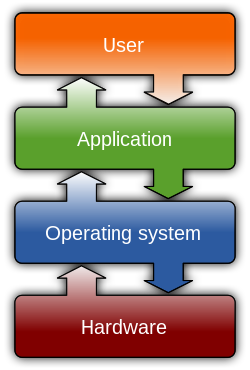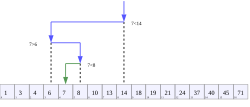In computing, external memory algorithms or out-of-core algorithms are algorithms that are designed to process data that are too large to fit into a computer's...
9 KB (1,031 words) - 21:20, 19 January 2025
sorting algorithms are external memory algorithms and thus applicable in the external memory model of computation. External sorting algorithms generally...
14 KB (2,176 words) - 17:38, 4 May 2025
term in computing, see auxiliary memory For the use of the term in computer science, see external memory algorithm This disambiguation page lists articles...
327 bytes (80 words) - 16:16, 21 January 2019
cache's performance. It is different than the external memory model because cache-oblivious algorithms do not know the block size or the cache size. In...
13 KB (1,843 words) - 05:14, 3 November 2024
accessing internal memory, the need for efficient traversal of external memory exists. For external memory algorithms the external memory model by Aggarwal...
9 KB (1,558 words) - 19:55, 12 October 2024
The buddy memory allocation technique is a memory allocation algorithm that divides memory into partitions to try to satisfy a memory request as suitably...
12 KB (1,451 words) - 08:03, 12 May 2025
external memory (PEM) model is a cache-aware, external-memory abstract machine. It is the parallel-computing analogy to the single-processor external...
16 KB (1,961 words) - 08:49, 16 October 2023
technique for overcoming the memory-size problem is using external sorting, for example, one of the ways is to combine two algorithms in a way that takes advantage...
71 KB (6,618 words) - 23:41, 27 July 2025
Euclidean algorithm extended k-d tree extendible hashing external index external memory algorithm external memory data structure external merge external merge...
35 KB (3,135 words) - 18:46, 6 May 2025
computing tasks. External space: space needed on a disk or other external memory device; this could be for temporary storage while the algorithm is being carried...
27 KB (3,335 words) - 17:43, 3 July 2025
operating system that uses paging for virtual memory management, page replacement algorithms decide which memory pages to page out, sometimes called swap out...
47 KB (6,238 words) - 02:10, 22 July 2025
Fragmentation (computing) (redirect from External fragmentation)
when free memory is separated into small blocks and is interspersed by allocated memory. It is a weakness of certain storage allocation algorithms, when they...
20 KB (2,715 words) - 19:43, 21 April 2025
memory is ever "lost" (i.e. that there are no "memory leaks"). The specific dynamic memory allocation algorithm implemented can impact performance significantly...
26 KB (3,004 words) - 05:39, 15 July 2025
Cache-oblivious distribution sort (category External memory algorithms)
to fit in a cache where operations are done. In the external memory model, the number of memory transfers it needs to perform a sort of N {\displaystyle...
6 KB (966 words) - 11:50, 19 December 2024
heavy hitters using external memory. Cormode, Graham (2014). "Misra-Gries Summaries". In Kao, Ming-Yang (ed.). Encyclopedia of Algorithms. Springer US. pp...
8 KB (992 words) - 20:21, 27 May 2025
also referred to as binary merges. The k-way merge is also an external sorting algorithm. A 2-way merge, or a binary merge, has been studied extensively...
16 KB (2,409 words) - 01:39, 8 November 2024
Funnelsort (category External memory algorithms)
in the context of the cache oblivious model. In the external memory model, the number of memory transfers it needs to perform a sort of N {\displaystyle...
8 KB (1,427 words) - 03:39, 31 July 2024
SLOB (redirect from SLOB memory allocator)
suffers greatly from external fragmentation. SLOB currently uses a first-fit algorithm, which uses the first available space for memory. In 2008, a reply...
2 KB (239 words) - 01:19, 14 April 2025
numbers of intermediate values being spilled to memory and then restored. The Sethi–Ullman algorithm (also known as Sethi–Ullman numbering) produces code...
6 KB (789 words) - 15:13, 24 February 2025
factors" in between. The algorithm got its name after an article by David H. Bailey, FFTs in external or hierarchical memory, published in 1989. In this...
5 KB (633 words) - 08:12, 18 November 2024
genetic algorithm (GA) is a metaheuristic inspired by the process of natural selection that belongs to the larger class of evolutionary algorithms (EA)....
69 KB (8,221 words) - 21:33, 24 May 2025
Merge sort (category Divide-and-conquer algorithms)
merge-sort) is an efficient, general-purpose, and comparison-based sorting algorithm. Most implementations of merge sort are stable, which means that the relative...
49 KB (6,727 words) - 13:35, 30 July 2025
Best, worst and average case (category Analysis of algorithms)
combination of tolerances and external conditions. The term best-case performance is used in computer science to describe an algorithm's behavior under optimal...
13 KB (1,273 words) - 21:09, 3 March 2024
Binary search (redirect from Binary search algorithm)
half-interval search, logarithmic search, or binary chop, is a search algorithm that finds the position of a target value within a sorted array. Binary...
77 KB (10,006 words) - 02:23, 29 July 2025
Algorithmic art or algorithm art is art, mostly visual art, in which the design is generated by an algorithm. Algorithmic artists are sometimes called...
26 KB (2,693 words) - 08:12, 13 June 2025
A maze-solving algorithm is an automated method for solving a maze. The random mouse, wall follower, Pledge, and Trémaux's algorithms are designed to be...
20 KB (2,893 words) - 13:37, 22 July 2025
Internal sort (category Sorting algorithms)
can all be held in memory as one large chunk, then this performance hit is avoided. On the other hand, some algorithms handle external sorting rather better...
2 KB (305 words) - 10:24, 3 December 2022
The Cooley–Tukey algorithm, named after J. W. Cooley and John Tukey, is the most common fast Fourier transform (FFT) algorithm. It re-expresses the discrete...
36 KB (5,348 words) - 10:22, 3 August 2025
Tracing garbage collection (redirect from Mark–sweep algorithm)
objects, the memory usage is twice as high compared to other algorithms. The technique is also known as stop-and-copy. Cheney's algorithm is an improvement...
37 KB (5,282 words) - 03:36, 2 April 2025
Parallel RAM (category Analysis of parallel algorithms)
PRAM algorithms Flynn's taxonomy Lock-free and wait-free algorithms Random-access machine Parallel programming model XMTC Parallel external memory (Model)...
11 KB (1,283 words) - 05:28, 3 August 2025










